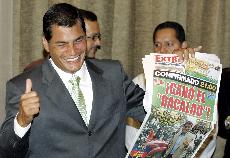Correa predicts presidential win, plans reforms

Nov 28, 2006
Last updated on May 12, 2016 at 06:31 a.m.
QUITO, Ecuador – Rafael Correa, the leftist nationalist headed to victory in Ecuador’s presidential race, is already planning radical reforms when he takes office in January.
That is putting him on a fast track to a dangerous confrontation with the country’s opposition-controlled Congress – a body he has called a “sewer” but which he needs to carry out his reforms.
“We receive this triumph with deep serenity and humility,” the 43-year-old Correa, who calls himself a “personal friend” of Venezuela’s anti-U.S. President Hugo Chavez, said at a news conference Sunday night.
With 58 percent of the ballots counted, Correa had a 65 percent to 35 percent lead over banana tycoon Alvaro Noboa, Ecuador’s Supreme Electoral Tribunal said Monday.
Get The Daily Illini in your inbox!
While votes in Noboa’s stronghold of Guayas, Ecuador’s most populous province, were among the last to be tallied, even a strong advantage there would not be enough for Noboa to win.
Correa’s followers took to the streets in caravans with musicians to celebrate a victory that few questioned except Noboa, who said he would await the end of the official count that might not come until Tuesday.
Correa said his victory “is a clear message to our traditional political class of the profound changes that our citizens want. This country doesn’t need patching up. It needs a new constitution in tune with the times.”
Correa, who has a doctorate in economics from the University of Illinois, surged in voter support as a fresh-faced outsider determined to reform Ecuador’s political system.
His view that the Ecuadorean democratic system is designed to benefit parties rather than people is shared by many voters fed up with corruption, greed and incompetence in the political establishment.
During the campaign, Correa attacked Ecuador’s Congress as a “sewer” of corruption and ran no candidates for the legislature. He now faces a Congress totally in the hands of his opponents _ but says that’s not important.
“Let’s stop worrying so much about Congress. Let them scrutinize what they want. We’re not afraid,” he said. “What we won’t tolerate is any attempt at instability or blackmail.”
Correa says his first act after being sworn in as president on Jan. 15 will be to call for a national referendum on the need to elect a special assembly that could rewrite the constitution and even shut down Congress.
That puts him on a collision course with the legislature, which has dismissed Ecuador’s last three elected presidents, violating impeachment proceedings in the process, after street protests demanding their ousters.
Jaime Duran, a public opinion analyst who served as chief of staff in a previous government, noted that the congressmen elected in October were just as legitimately elected as Correa.
“They have the same right to serve as Correa does,” he said.
Correa’s problem is that Congress would have to approve a constitutional reform to allow creation of a constituent assembly. And it has blocked attempts by the last two presidents to rewrite the constitution.





